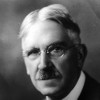“ The more passive the mind is, the more truly objects will impress themselves upon it. ”
John Dewey, Democracy and Education (1916). copy citation
| Author | John Dewey |
|---|---|
| Source | Democracy and Education |
| Topic | impressing mind |
| Date | 1916 |
| Language | English |
| Reference | |
| Note | |
| Weblink | http://www.gutenberg.org/files/852/852-h/852-h.htm |
Context
“The educational result was only to confirm the exclusion of active pursuits from the school, save as they might be brought in for purely utilitarian ends—the acquisition by drill of certain habits. In the second place, the interest in experience as a means of basing truth upon objects, upon nature, led to looking at the mind as purely receptive. The more passive the mind is, the more truly objects will impress themselves upon it. For the mind to take a hand, so to speak, would be for it in the very process of knowing to vitiate true knowledge—to defeat its own purpose. The ideal was a maximum of receptivity. Since the impressions made upon the mind by objects were generally termed sensations, empiricism thus became a doctrine of sensationalism—that is to say, a doctrine which identified knowledge with the reception and association of sensory impressions.”
source



